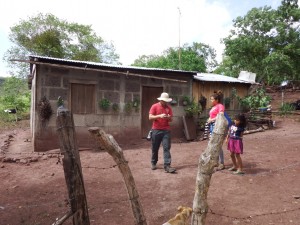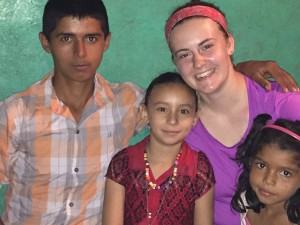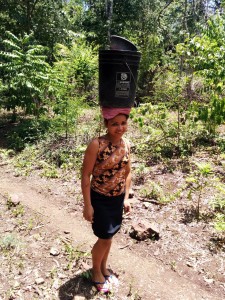
UW-Stout student Trevor Sobtzak, left, takes GPS coordinates outside a home in Las Macias as Marling Garcia, center, and Anyel Garcia watch.
Menomonie, Wis. — In Las Macias, Nicaragua, fresh water isn’t taken for granted. Each day, women and girls walk a half-mile or more one way on a steep, rocky path to a well and return home balancing five-gallon buckets of the precious resource on their heads.
They make the trip seven to 10 times a day.
A project through University of Wisconsin-Stout is on the road to making life easier in Las Macias. The new student chapter of Engineers Without Borders USA visited Las Macias in late summer to investigate how to bring clean water to homes of the village’s approximately 500 residents.
One aspect of the project received a major boost in September when UW-Stout was awarded a $454,065 grant from the National Science Foundation. The grant’s purpose is to examine the value of humanitarian service learning for undergraduate students.
The grant will closely track the Nicaragua project, which will involve engineering and applied social science students as it progresses during the next four years. The grant also will look at outcomes of other Engineers Without Borders student chapter projects nationally.
For UW-Stout Associate Professor Devin Berg and his engineering students, the project and grant create an opportunity to help Las Macias, which is about a two-hour drive from Managua, the capital of Nicaragua.
Berg, three students and others were part of a fact-finding trip in August. They determined that it’s possible to create a system to deliver water to village homes, using the existing well and pumping water to a holding tank above the village.
“This is the next big hurdle to improving their daily lives,” Berg said of the water system, noting that the village was wired for electricity five years ago, making it possible to pump the water and also remove contaminants.
The project will provide fresh water to homes but will not include a wastewater system.
As the project progresses, analyzing its real impact on Las Macias and on the engineering and technology students involved will be UW-Stout applied social science students, directed by Associate Professor Tina Lee. She will train her students, several of whom will go on the next trip to Las Macias, to study the community and student-community interaction.
“Community development, economic development and applied anthropology projects might benefit from this research,” Lee said. “A wider understanding of how to balance the needs of students and communities could be broadly applied to service learning projects outside of the STEM fields.”
Elizabeth Buchanan, interim director of Research Services at UW-Stout, will manage the grant.
“The project seeks to find best practices for university and college-based service learning for all stakeholders in these enterprises,” Buchanan said. “By providing students the opportunity to explore the engineering curriculum as it applies to the challenges of globalization, population explosion, resource depletion and so on, we are promoting and contributing to more ethically attuned, socially aware and responsible professionals and, in turn, working toward important changes in the engineering professions more broadly.”
Students excited about project
Up to 20 engineering students in the engineering chapter could be involved. Officers in the student chapter, Allison Roush and Trevor Sobtzak, made the trip in August along with chapter member Emmanuel Seyoum.
The challenges faced daily by many people in Nicaragua, the Western Hemisphere’s second-poorest country, were eye-opening, students said.
“This project has caused me to go about my studies with a more humble perspective. The ability to go to a faucet and get water is really something that I know I take for granted,” said Roush, of Phillips, a junior who is majoring in manufacturing engineering.
“This is broadening my horizons and teaching me about new areas and engineering methods I wouldn’t have been exposed to otherwise. That is priceless,” she said.
Each person on the nine-day trip lived with a different host family in the village. “This allowed us to gain a broader perspective of how the community lives and to better experience their values,” Roush said.
Sobtzak agreed. “I’ll never forget how welcoming the community of Las Macias was. When we arrived, we were welcomed with a small church ceremony followed by a Nicaraguan-style song and dance. Then, before we knew it, they had us up and dancing. The community members were all very optimistic about their community and its future; everyone had such a positive attitude and outlook,” said Sobtzak, of Mahtomedi, Minn., a senior majoring in engineering technology.
Moving ahead

UW-Stout student Allison Roush, second from right, takes a selfie with Las Macias residents, from left, Julio Garcia, Neybeli Jarquin and Anyeli Nathalia.
The next project steps are to get cost estimates, discuss options with the village and design a system. Berg hopes work will begin in summer 2016.
The student engineering chapter and Berg are working with a nongovernment community development agency to be the project’s main contact in Nicaragua, as well as with Wisconsin-Nicaragua Partners of the Americas.
The idea for the Las Macias project came from Marling Garcia, who is from Las Macias and graduated in May from Northcentral Technical College in Wausau.
Along with Berg and the students, the group that traveled to Nicaragua in August included UW-Stout Professor Ann Parsons, biology, who has taught a class in Nicaragua and acted as a community relations liaison; a professional engineer from IllinoisAmerican Water; and a translator.
The grant is expected to enhance engineering and technology education at UW-Stout. Project outcomes will be used to guide the development of a course on global engineering.
UW-Stout’s Nakatani Teaching and Learning Center; Applied Research Center; and Social Science Research Center will provide grant support by training students and by conducting and evaluating the research.
News link: www.uwstout.edu/news/articles/National-grant-to-track-outcomes-of-Nicaraguan-village-project.cfm

